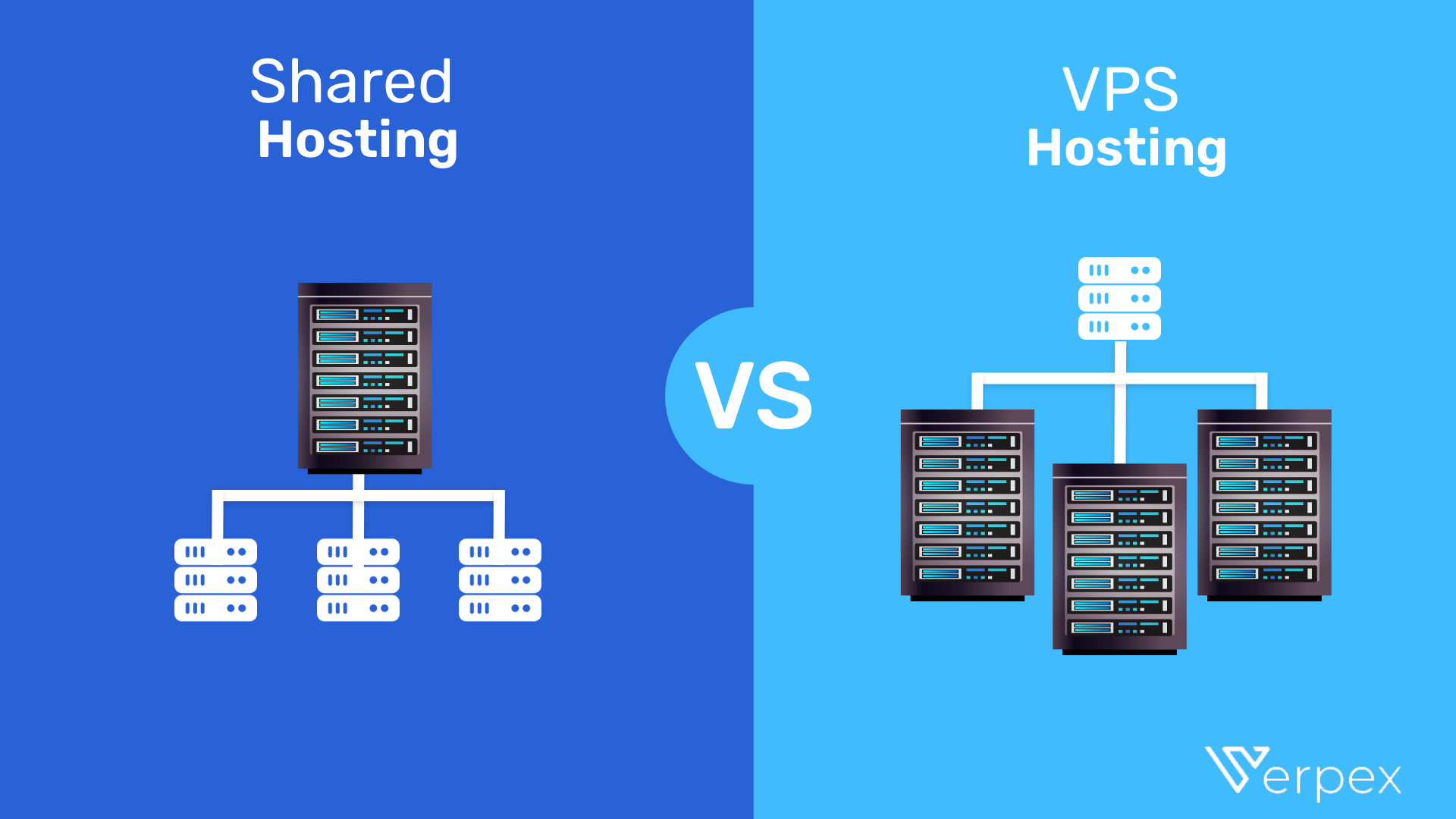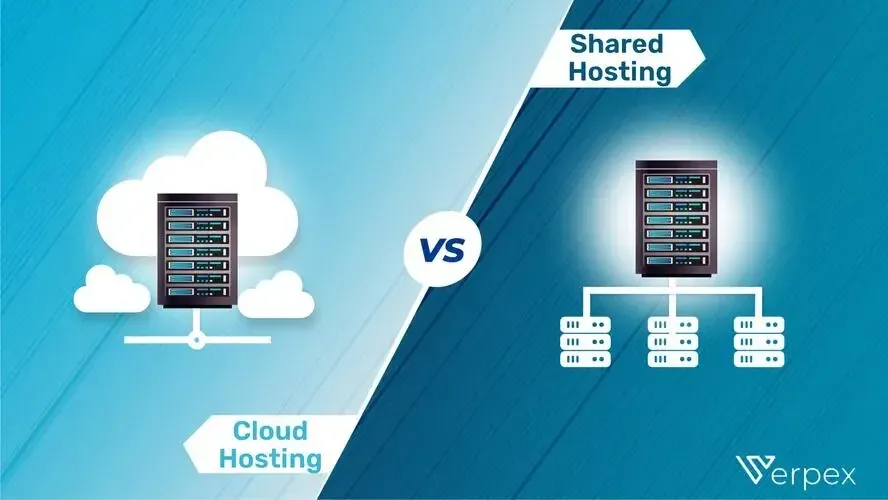Shared hosting offers affordable shared server space but may slow down as your website grows. Cloud hosting shares resources across multiple servers and is more efficient.
choose cloud hosting for better performance as your website traffic increases. This article provides a comparison to guide you in choosing the right web hosting for your website's needs.
Understanding Cloud Hosting and Shared Hosting
Common Features
Customer service and uptime guarantees
These features will be almost the same.
Shared data center space
Both hosting types use data center space but in different ways.
Both are good for small businesses
Both hosting types offer affordable and practical solutions for small businesses.
Differences
Data center resources distribution:
Shared hosting: Many websites share the same server, which can lead to bandwidth competition.
Cloud hosting: Spreads out resources over many servers, giving websites what they need when they need it. This helps manage high traffic more efficiently.
Breaking Down the Differences: Comparing Cloud Hosting and Shared Hosting
| Shared Hosting | Cloud Hosting | Verdict | |
|---|---|---|---|
| Resource Allocation | Limited to a single server resource. Many sites share the same space, possibly affecting performance due to high demand from other sites. | Multiple physical servers are configured to work like one. More efficient sharing, enhancing overall performance. | When a cloud-hosted website goes above its data limit or has a surge in visitors, it can use resources from another server, improving resource efficiency. |
| Performance | Ideal for smaller websites. Good performance until the site grows significantly. Increased loading times and performance issues with site growth. | Efficient resource distribution. Notably faster speeds compared to shared hosting. Often performs tasks twice as fast. | Unlike shared hosting, performance problems with cloud computing are not common unless your site's traffic greatly exceeds your set traffic limit. |
| Traffic Volume | Shared hosting has traffic limits; and struggles with high visitor numbers. Monthly visitor limits; exceeding these slows down the site. Requires package upgrade from hosting provider for higher traffic. | Handles high traffic effortlessly. Can allocate extra resources for traffic spikes. Stable performance since it is hosted over multiple servers instead of just one. | Cloud hosting easily takes this round with its endless scalability. |
| Security | Shared databases and single server usage increase vulnerability to cyber attacks. Breaches are rare due to strong data host protections. Secure enough for most users. | Cloud computing features multiple security layers. Firewalls and antivirus software are similar to other hosting types. | Cloud hosting solutions are as secure as shared hosting and allow for additional security installations on the server. |
| Control | Limited control with pre-approved software and plug-ins; unable to install own software. | More flexibility with the ability to install applications and change source code for site customization. | Cloud hosting wins again for giving you more control over servers, but you’ll have to follow specific terms and conditions. |
| Server Administration | Highly simple and user-friendly. There are no server administration responsibilities for the user. All maintenance and technical issues are handled by the data host. | Similar to shared hosting in server management. Option for managed hosting plans. The host takes care of maintenance and administration tasks. | This one is really close as both operate with a lot of similarities. |
| Scalability | Limited bandwidth and processing power. Overuse requires a plan upgrade. Easy upgrade by contacting the provider. | Easily and quickly scalable. Resources are shared across the entire data center. | Cloud hosting is made to handle spikes in traffic and is great for scalability. |
| Price | Many websites are put on a single server and the costs for each site are low. Competitive market with low prices. Typically costs just a few dollars per month. | Cloud web hosting plans cost more due to higher resource usage. Managed cloud hosting prices vary based on space and power needs. | It’s unlikely shared hosting will ever be beaten on price. An easy choice for the winner. |
| User-friendliness | User-friendly with a simple cPanel. Easy site editing and plug-in installation. | User-friendly with similar tools to shared hosting. Requires technical knowledge for additional application installation. | Shared hosting is user-friendly and quick to set up, making it an ideal choice for beginners and those with limited technical skills. |
| Customer Support | You get 24/7 support from reputable hosts like Verpex. Extensive Knowledge Base Guides and FAQs. Hassle-free management; everything is taken care of. | Similar customer support as shared hosting. Little difference in support resources compared to shared hosting. | Both shared and cloud hosting services have common customer care services. However, the quality of service depends on the hosting provider. |
Shared vs. Cloud Hosting for Mobile Applications

In today's digital world, mobile apps are essential for both business and personal use. Choosing the right hosting provider is crucial to keep your app fast, reliable, and scalable. Let's explore the differences between shared and cloud hosting for mobile apps.
| Shared Hosting | Cloud Hosting | |
|---|---|---|
| Performance and Speed | It is affordable but not always the best for mobile apps. It can be slow during busy times and struggles with dynamic content. | Cloud hosting, however, offers better speed and can handle lots of traffic, keeping apps fast and responsive. |
| Scalability | It has limits on growth, which can be a problem for popular apps. | It is more flexible, letting you easily adjust resources as your app grows, which is great for apps with changing traffic. |
| Uptime and Reliability | It is generally reliable, but might not be enough for apps needing constant availability. | It is more reliable, with better uptime and backup servers to keep apps running smoothly. |
| Cost Implications | It is cheaper, and suitable for simpler or new apps. | It costs more but offers better features like performance and security, important for most apps. |
| Ease of Management | It is simpler to manage, and good for those with less tech knowledge. | It is more complex but has better tools for managing complicated apps, making it a versatile option. |
Ease of Migration: Moving Between Hosting Types
Even if you're already using a hosting service, migrating to a different hosting type is simplified and stress-free with Verpex, we guarantee a smooth and efficient migration:
Versatile Compatibility: Supports seamless migration across shared, VPS, dedicated server, and cloud hosting environments.
Customizable Solutions: Tailored migration plans to fit the unique requirements of your website or application.
Minimal Downtime: Strategies focused on reducing the impact on your operations during the migration process.
Technical Support: Expert guidance and support throughout the migration to address any challenges or concerns.
Data Integrity: Robust measures to ensure complete data transfer without loss or corruption.
Cost-Effective Strategies: Migration options considering financial implications and optimizing your investment.
When to Consider Upgrading Your Hosting Plan

When your site is running slowly
This indicates insufficient resources and signals a need for an upgrade.

There’s an increase in traffic
An upgrade is required to handle growing traffic and site demands.

You need multiple sites
Basic packages typically limit you to one website. An upgrade is required to host multiple websites simultaneously.
Comparing More Web Hosting Possibilities
Shared Hosting Vs. VPS
Virtual private server hosting (VPS) hosting offers a balance between shared and dedicated servers. Although you’re sharing the same server with other websites, you get a private space, ensuring your resources are exclusively yours.


Shared Hosting Vs Dedicated Hosting
Dedicated hosting offers more power and storage, ideal for high-traffic sites or large enterprises that need a dedicated server. However, it's more expensive than shared hosting
Final Words
Although cloud hosting excels in many areas, shared hosting is still valuable. It's ideal for beginners in website development or those needing a basic, easy-to-manage site due to its low cost and fully managed service.
More established users requiring scalability, additional storage, or processing power should consider cloud hosting options.
Ready to learn more? Explore detailed information about both cloud and shared hosting on our blog, and don't forget to check the frequently asked questions below too.
Frequently Asked Questions
Will the data center location affect speeds?
Yes. Generally, the closer you are to where your data is hosted, the faster your website will be.
Can I customize my shared hosting package?
No, our shared hosting packages come with set bandwidth and storage limits, and you can’t install software on the server. You can however easily upgrade or switch to managed cloud server if you prefer.
Are trial periods available?
No, but Verpex offers you a 60-day money-back guarantee if you're not completely satisfied with your hosting package.
How does cloud hosting affect the SEO performance of a website?
Cloud hosting solution improves SEO by making websites load faster and stay online more consistently. This is great for search engine rankings. It's also good at handling many visitors, which helps websites perform better for SEO.

I've been navigating the web hosting waters for years now. As the Chief Editor at Verpex, I team up with some awesome writers to dish out the good stuff on hosting. Got a Master's in Journalism, so I always have an eye out for quality. Whether you're just dipping your toes or you're a seasoned surfer, I'm here to make everything web hosting feel like a breeze
View all posts by Julia Lozanov




















